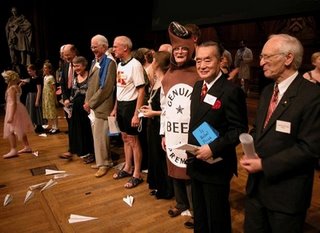
IgNobel: blessing or curse?
The extremes are always awarded: the best movie (Oscar prize), the best athlete (gold medal), the best music (Grammy), the best in science (Nobel) and sometimes the worst is remembered too (Razzie Award for the worst in area concerning cinema).
But since 1991 scientists around the world have been recognized simply by strange things they have done: it’s the function of the IgNobel prize, delivered yearly to ten seminal works that an average person couldn’t understand why on earth it was carried out. Sometimes even scientists couldn’t.
Ig, as the prize is known, has awarded lots of studies along its history. I list some of them bellow:
Biology, 2006 - mosquitoes are attracted equally by human feet stink and limburg cheese.
Physics, 2006 - nsights into why, when you bend dry spaghetti, it often breaks into more than two pieces.
Chemistry, 2005 – Do people swim faster in syrup or in water?
And so on…
1 comment:
and do people swin faster in syrup or in water, by the way?
Post a Comment